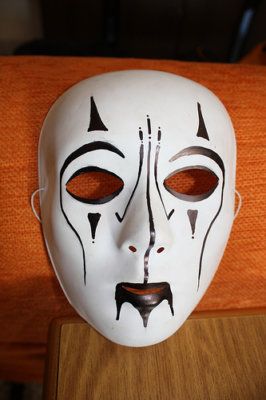Black and White Thinking – How to Stop Being a Drama Addict
Been called a drama queen? Or always told to calm down and be realistic? It’s time to learn about black and white thinking.
What is black and white thinking?
When stress hits, we all tend to think in extremes. If you are worried you might lose your job, this might be thoughts like “I’ll never find a job as good. I don’t know how I can ever manage, that was the best position I will ever have”. You lose sight of the fact that you are highly employable, have never had trouble finding work in the past, and didn’t even like your job that much a few months ago.
This kind of all or nothing thinking is known as ‘black and white thinking’. You can often spot it by the language of extremes it tends to involve, with words such as ‘always’, ‘never’, ‘wonderful’, ‘disaster’, ‘perfect’, and ‘failure’ being some examples.
Why do I always think in extremes?
In some ways, thinking in such a dramatic way is the brain’s natural response to stress and is an inbuilt survival mechanism. In primitive times the mind needed to simplify when there was a threat to survival. If faced with an enraged wild animal or invading tribe about to attack, this response made sure you didn’t waste precious seconds stopping to consider options. You just quickly thought ‘run or perish’.
Of course nowadays the stress we face is usually far from life threatening. But unfortunately our brain remains on its caveman programming, giving ‘fight or flight’ responses to perceived threats. Some of us quickly come down from the cortisol rush this involves, and our minds go back to more measured and practical ways of seeing things. But it seems that some of us enjoy the rush, stay fired up on the stress, and can become quite hooked on dramatic thinking.
Why is black and white thinking a problem?
There are many ways that dramatic thinking can hold you back. See if the following sound familiar.
1. It stops us from seeing options and opportunities.
Black and white thinking has us seeing two ways something can work out — really well, or really terribly.
Ever had the experience where a month after a stressful experience ends, other great options you should have taken seem so obvious you are left kicking yourself? As you only saw two choices? You likely had the black and white thinking ‘blinders’ on.
2. It can lead to low moods.
The problem with dramatic thinking is that it is very exciting. And what goes up must come down. So extreme thoughts often lead to highs followed by lows. Black and white thinking can also lead to depression because it can be very negative and because the limited perspective it creates can leave you feeling trapped and powerless in life.
3. It can affect our relationships negatively.
Drama can make you feel exciting, and you might at first think that others like you because you are ‘interesting’. But the funny thing about being a drama queen (or king) is that while it tends to attract people on a superficial level, it often makes intimacy hard. It can be difficult for someone to get to know the real you behind the stories. And as for those superficial relationships, over time its possible that people can find your drama draining or distracting, which can present real problems with colleagues, for example.
4. It can be quite addictive.
The fight and flight response releases cortisol, which can be quite a buzz. Your cortisol level goes back to normal if you then channel the high into action and completing a goal. But if you instead go into dramatic thinking the anxiety this perpetuates means you are maintaining a higher cortisol level. If your black and white thinking then causes any kind of fear, you release even more cortisol. The ‘seize the day’ excitement cortisol brings can then be something you get used to and crave. In fact its been proven that if your cells are used to cortisol, they will send signals to the brain asking for more of it.
5. It stops you from moving forward with your life.
People who like black and white thinking often refuse other people’s advice or don’t even want it, preferring the attention a sad story garners then a solution, and falling into the trap of talking over action. And at the end of the day drama takes a lot energy – literally. The cortisol rush it encourages stresses out your adrenals, leading to fatigue. And black and white thinking definitely exhausts the mind. This all adds up to you having no energy left to look at other options, make concrete plans, and move forward.
How Do I Curb My Black and White Thinking?
Black and white thinking, as mentioned above, is quite addictive. So it’s not as simple as just ‘deciding’ to stop.
Of course admission is a great first step.
It can feel embarrassing to admit to friends and family that you know you are a drama king or queen, and it can be unhelpful if all that results in is a lot of ‘I told you so’ responses. So just start with admitting your love of extreme thinking to yourself, and making the choice to work towards change.
Start to pay attention to what you say.
When you are talking to people, do you tend to go on about your problems often? How dramatic and extreme are the stories you tell? If the other person suggests less exciting responses to your problem, do you listen, or cut them off?
Start to track your thoughts.
So much of our thinking goes on unnoticed that trying to learn to catch a thought can feel very much like trying to catch a fish with your bare hands! But with practise you will get better. A helpful technique can be to set a timer to go off once an hour and when it does, stop and notice what you are thinking about. Another great tip is to learn mindfulness. Mindfulness trains you to constantly bring your attention to the present, noticing what you are thinking and feeling in any given moment. Even ten minutes of mindfulness a day is shown to reduce cortisol levels.
Learn to deal with being boring.
When you first learn to think more rationally you will in all likelihood feel bored and boring. Think in shades of grey? You?! But try to see the bigger picture. Remember that if you stay hooked on drama you will probably be telling the same stories in five years time, with the same life and same problems. Dropping the drama might make you feel a bit bored, but on the other hand your actual life might start to move and change at last in ways that are far from boring. And once you drop the addiction to drama you might realise that shades of grey are not necessarily boring at all. It was the drama that was boring.
Learn what balanced thinking is.
If you have been engaging in black and white thinking for some time, perhaps even learning it from a parent and spending most of your life with an extreme thought pattern, dramatic thoughts might be so second nature to you that even the things you think sound balanced are actually quite extreme. It can help to think of someone you know who is very practical (or yes, boring in your eyes). How might they see the problem you are dealing with? And what value does their perspective have?
Consider Cognitive Behavioural Therapy (CBT).
Dramatic thinking, like any addiction, is actually quite hard to drop by ourselves. CBT is a popular, short form therapy that actually has balanced thinking as one of its main focuses and looks at the way our thoughts, feelings, and actions are a connected cycle. A CBT therapist can quite quickly have you spotting your dramatic thinking. They can show you how to chart your thoughts to find a more balanced perspective and then use that balanced perspective to take informed actions that move your forward, getting you off that drama treadmill at last.
pictures by Sarah Bosvelt, Jason Tester Guerilla
 Andrea M. Darcy is a mental health and wellbeing expert, who has done some training in person-centred counselling and coaching. She often writes about trauma, relationships, and ADHD, and advises people on how to plan their therapy journey. Find her on Instagram @am_darcy
Andrea M. Darcy is a mental health and wellbeing expert, who has done some training in person-centred counselling and coaching. She often writes about trauma, relationships, and ADHD, and advises people on how to plan their therapy journey. Find her on Instagram @am_darcy







Drama queen women are everywhere nowadays. Is there a doctor in the house?
Hi there, that’s really a big generalisation you’ve made there. It’s easy to blame others in life, but it doesn’t tend to take us anywhere fast but more misery. Have you considered therapy, to look at what within you sees you attract dramatic people into your life? You might find it useful.
Thank you , very helpful. I really identify with all that was put forth , the mindfulness and CBT truly work and have made a huge difference for me personally. I am no longer cause if myself such deep levels of depression and anxiety as I did for so many years !
Thanks for sharing Dan, really glad to hear mindfulness and CBT help! They are a great combination.
I feel unsatisfied with the relations i have. May be i am expecting for the extremes. Have too many friends, but no one is permanent. I have a bad habit of comparing myself with others, so i cant enjoy bit of my life. I can’t feel intimacy in any relation 😖
Hi Aysh, we don’t know anything about you so can’t really comment, except to say use the search bar to find all our helpful articles on relating and intimacy, and also that therapy is very useful if you struggle with relating, there are some types of therapy that focus on just that, read more here (the article talks about love, but the therapies mentioned are designed to help with all types of relating) http://bit.ly/findlovetherapy Best, HT.